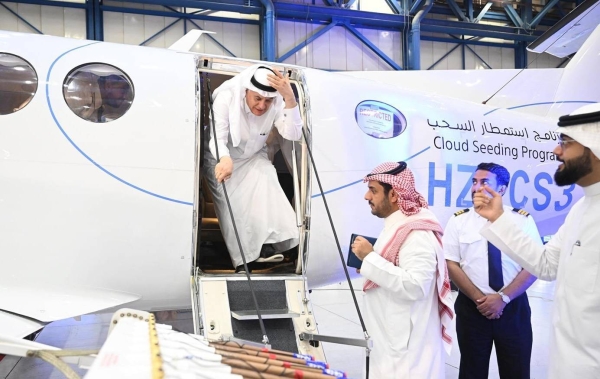The Minister of Environment, Water and Agriculture, Eng. Abdulrahman Al-Fadhli, has launched new initiatives under the Regional National Program for Cloud Seeding. The program aims to improve rainmaking operations, reduce operational costs, and enhance the outcomes of the National Cloud Seeding Program. Dr. Ayman Ghulam, CEO of the National Center of Meteorology, highlighted that the program will contribute to water security and the sustainable management of natural resources. By leveraging global technologies, the initiative aims to improve climate conditions and increase rainfall, helping address the environmental challenges posed by climate change.
Since its launch, the program has made significant achievements, including the first rain-seeking flight in April 2022. Dr. Ghulam also pointed to the program’s role in complementing initiatives such as the Green Saudi Arabia and the Green Middle East Summit. Ayman Al-Bar, Executive Director of the National Program for Cloud Seeding, detailed the program’s operational progress, its impact on Saudi Arabia’s water resources, and its role in enhancing vegetation cover. The program has completed six phases of operations, conducting 444 flights over more than 1,400 flight hours, and generating 5 billion cubic millimeters of rainfall.
The National Cloud Seeding Program was launched as part of the Middle East Green Summit, announced by Crown Prince Mohammed bin Salman under Saudi Arabia’s Vision 2030. The program aims to increase rainfall to secure new water sources and boost vegetation cover. The program initially started its rain enhancement efforts in Riyadh, Hail, and Qassim, with the goal of addressing climate change, desertification, and drought challenges. The program has also developed research studies that optimize the use of weather elements in Saudi Arabia, with plans to further localize technology and knowledge.
The program’s achievements include conducting the first rain-seeking flight in April 2022. Dr. Ghulam highlighted the importance of leveraging global technologies to improve climate conditions and increase rainfall, helping to address environmental challenges posed by climate change. Ayman Al-Bar, Executive Director of the National Program for Cloud Seeding, discussed the program’s operational progress, impact on water resources, and role in enhancing vegetation cover. The program has deployed 8,753 rain-seeding flares and generated 5 billion cubic millimeters of rainfall, with plans to further localize technology and knowledge.
The National Cloud Seeding Program aims to contribute to water security and the sustainable management of natural resources. The program has completed six phases of operations, conducting 444 flights over more than 1,400 flight hours, and deploying rain-seeding flares to generate rainfall. The program is part of initiatives such as Green Saudi Arabia and the Green Middle East Summit, with the goal of increasing rainfall to secure new water sources and boost vegetation cover. The program has made significant achievements, including the first rain-seeking flight in April 2022, and plans to continue its efforts to optimize rainmaking operations and reduce operational costs.









